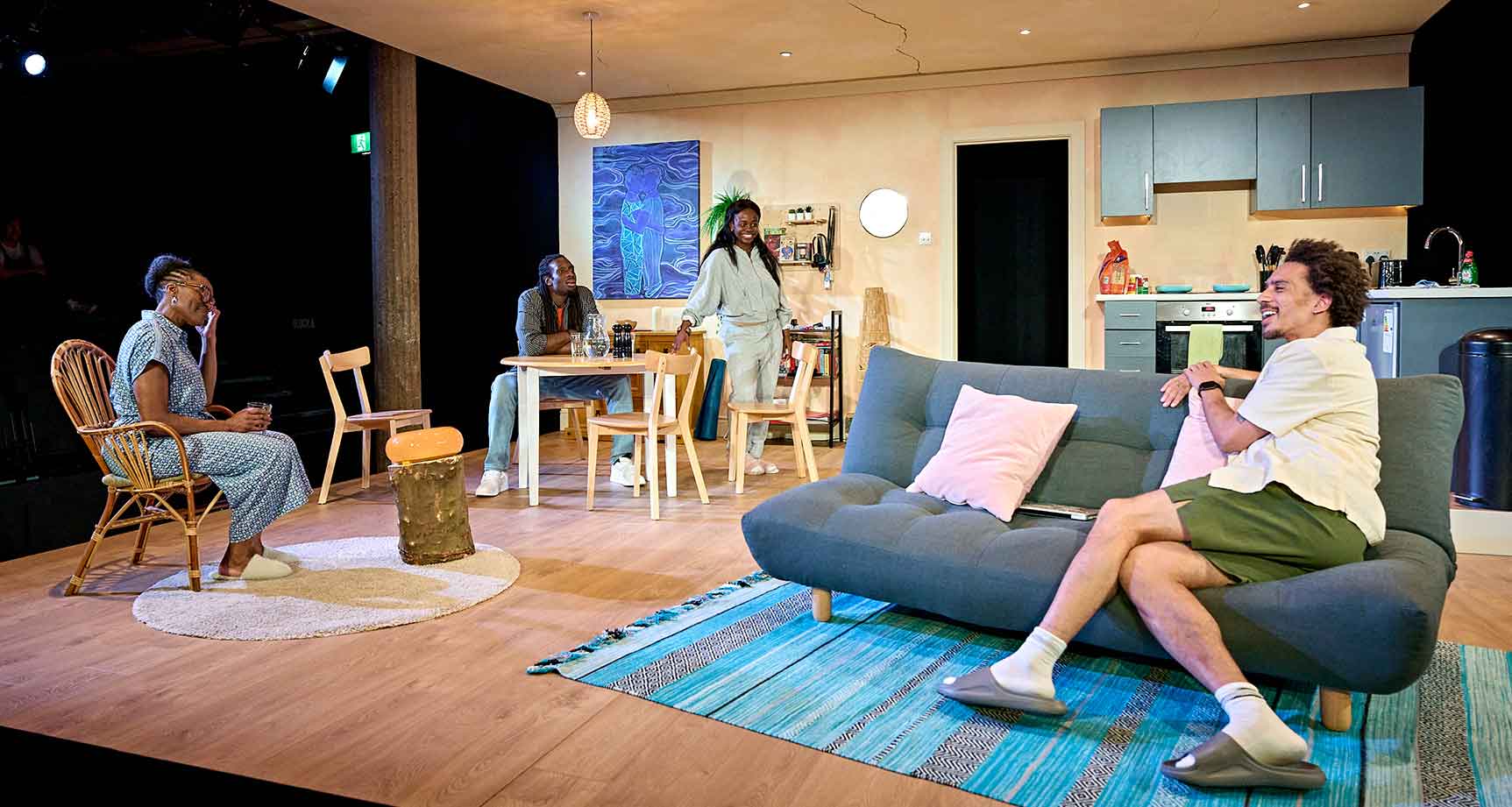
My Father’s Fable is a captivating and witty story of self-discovery, family and culture, now on at Bush Theatre. Alongside its poignant exploration of grief and loss, the show will have you howling.
Faith Omole makes her debut as the writer of My Father’s Fable, having previously won the Alfred Fagon Award for acting and, more recently, a nomination for the Olivier Award for her role as Joy in Standing at The Sky’s Edge.
Having seen both shows, I can confirm that Omole is as fabulous a writer as she is an actor. With the support of director Rebekah Murrell (J’ouvert, West End) and an outstanding cast, My Father’s Fable is a breath of fresh air.
We meet Peace (Tiwa Lade) and her partner Rob (Gabriel Akuwudike), as they prepare to host their guest, Bolu (Theo Ogundipe), for the next two weeks. Peace and Bolu were only recently connected after Bolu contacted her following her father’s passing. Realising they were half-siblings, Bolu travels from Nigeria to meet his sister for the first time.
However, Peace’s mother, Favour (Rakie Ayola), is determined to disrupt the joyous occasion. She also decides to stay over, claiming a migraine and relegating Bolu to the sofa bed. But Rob isn’t surprised by Favour’s controlling displays, which continue to strain his relationship with Peace.
Suspicious of Bolu, Favour is determined to fracture his budding relationship with her daughter and slights him wherever possible. Once Bolu arrives, a mess of Favour’s manipulation explodes.
Painted as a Nigerian scammer, Bolu is on the verge of leaving. Thankfully, in the nick of time, Peace sees reason, and the two finally share the truth. Following revelations of Bolu and Favour’s previous connection, Peace’s reality is shattered. In its place, a fresh understanding of her Nigerian heritage blossoms.
The twists and turns of My Father’s Fable make it an exciting watch, and its exploration of first and second gen British families is whole-heartedly relatable. The script is continually witty, and the ‘Nigerian mother’ tropes kept the audience belly laughing. The undivided engagement made it clear that the art reflected the audience, which continued to warm the room.
All four actors made great performances with strongly defined characters. Lade’s ‘Peace’ was exaggerated in her coyness, skilfully conveying the cognitive dissonance that came at the price of her naivety. As Rob, Akuwudike was so convincing it felt like he was playing himself! Despite playing a typical ‘millennial Londoner with a job in marketing/tech’, he successfully showed the subtleties of his character’s growth in boundary setting while maintaining his humour.
First meeting Bolu, he seemed a little too casual given the circumstances. But Ogundipe allowed his character to blossom, ultimately blowing me away with his emotional range and movement. Bolu felt slick, yet when the time came for his emotional outbursts, Ogundipe made sure the integrity of his passion was palpable. I’m excited to see where Ogundipe continues to take him.
The shining light that is BAFTA-winner Rakie Ayola blessed us with her presence as Favour. From the beginning, she ensured we understood her character, an overbearing mother with manipulative tendencies. Excellently timed snark and an increasingly menacing demeanour, Ayola slowly revealed the layers of Favour’s mask of insecurity. There was an air of Eartha Kitt’s Yzma, and the audience loved every second.
The set was a successfully unremarkable living space, and the lighting was simple yet effective. Music played before the show set the stage, introducing Nigerian culture as a central theme. These subtle supports felt right, allowing the performance to breathe and focus on the relationship dynamics.
Although I thoroughly enjoyed the show (I did not expect the reveal!), the ending was a little squished. Conversations that should’ve taken hours happened very quickly and probably could have been cut altogether. But this is a minor gripe, as I still left My Father’s Fable with a smile on my face, and my curiosity peaked regarding my own cultural identity.
The buzz from the audience continued as we left the theatre, and it seemed like many people had felt seen. Although the narrative of My Father’s Fable is somewhat remarkable and a little fantastical, it’s still relatable. It embraces the taboo and invites the audience in, reminding us that a little ‘weird’ is normal. A watch you won’t regret.
Need to know: My Father’s Fable runs until 27 Jul 2024 at the Bush Theatre. Find out more | Access £15 tickets up to 6 July using code AFRIDIZIAK at the checkout.



























